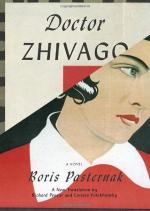|
This section contains 221 words (approx. 1 page at 400 words per page) |

|
According to Ronald Hingley, "Pasternak is more justly summed up as a poet who was also a prose writer than as one whose attainments in the two areas are of comparable importance."
As a young poet, Pasternak at first idealized, then repudiated, the flamboyant iconoclastic Mayakovsky. Pasternak's own early work had combined elements of the Russian Futurist and Symbolist Schools, but he soon developed his own poetic voice, fresh, impassioned, and rich in striking metaphor. His dazzling originality fused with his affirmation of life so uniquely that his friend and defender Lydia Chukovskaya called him "the only non-tragic Russian poet" and claimed that "His voice always sounded in the major key."
In Doctor Zhivago, Pasternak shares the religious and moral idealism of Dostoevsky and Tolstoy's vast panorama of all the levels of Russian society, but prose fiction lacks the disciplining structure of the conventional poetic forms...
|
This section contains 221 words (approx. 1 page at 400 words per page) |

|




